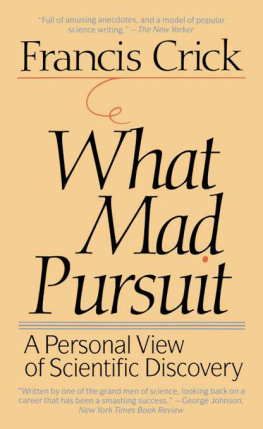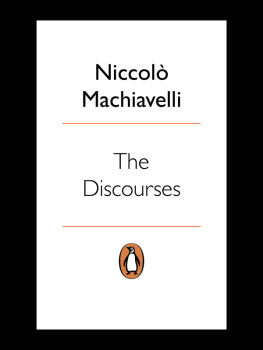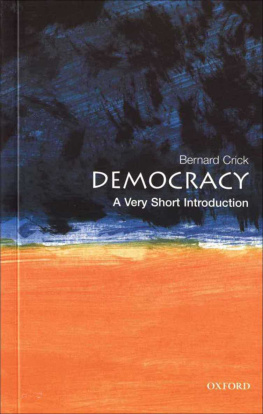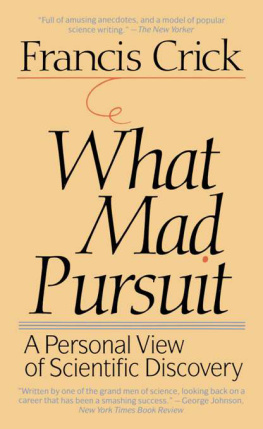Sir Bernard Crick - In Defence of Politics
Here you can read online Sir Bernard Crick - In Defence of Politics full text of the book (entire story) in english for free. Download pdf and epub, get meaning, cover and reviews about this ebook. year: 2012, publisher: Bloomsbury Publishing, genre: Politics. Description of the work, (preface) as well as reviews are available. Best literature library LitArk.com created for fans of good reading and offers a wide selection of genres:
Romance novel
Science fiction
Adventure
Detective
Science
History
Home and family
Prose
Art
Politics
Computer
Non-fiction
Religion
Business
Children
Humor
Choose a favorite category and find really read worthwhile books. Enjoy immersion in the world of imagination, feel the emotions of the characters or learn something new for yourself, make an fascinating discovery.
- Book:In Defence of Politics
- Author:
- Publisher:Bloomsbury Publishing
- Genre:
- Year:2012
- Rating:3 / 5
- Favourites:Add to favourites
- Your mark:
- 60
- 1
- 2
- 3
- 4
- 5
In Defence of Politics: summary, description and annotation
We offer to read an annotation, description, summary or preface (depends on what the author of the book "In Defence of Politics" wrote himself). If you haven't found the necessary information about the book — write in the comments, we will try to find it.
In Defence of Politics — read online for free the complete book (whole text) full work
Below is the text of the book, divided by pages. System saving the place of the last page read, allows you to conveniently read the book "In Defence of Politics" online for free, without having to search again every time where you left off. Put a bookmark, and you can go to the page where you finished reading at any time.
Font size:
Interval:
Bookmark:
TITLES IN THE BLOOMSBURY REVELATIONS SERIES
Aesthetic Theory, Theodor W. Adorno
On Religion, Karl Barth
The Intelligence of Evil, Jean Baudrillard
In Defence of Politics, Bernard Crick
Intensive Science and Virtual Philosophy, Manuel DeLanda
A Thousand Plateaus, Gilles Deleuze and Flix Guattari
Anti-Oedipus, Gilles Deleuze and Flix Guattari
Taking Rights Seriously, Ronald Dworkin
Discourse on Free Will, Desiderius Erasmus and Martin Luther
Education for Critical Consciousness, Paulo Freire
To Have or To Be?, Erich Fromm
Truth and Method, Hans Georg Gadamer
All Men Are Brothers, Mohandas K. Gandhi
Eclipse of Reason, Max Horkheimer
After Virtue, Alasdair MacIntyre
Time for Revolution, Antonio Negri
The Politics of Aesthetics, Jacques Rancire
An Actor Prepares, Constantin Stanislavski
Building a Character, Constantin Stanislavski
Creating a Role, Constantin Stanislavski
Some titles are not available in North America.
In Defence of Politics
Bernard Crick

Bloomsbury Academic
An imprint of Bloomsbury Publishing Plc
50 Bedford Square London WC1B 3DP UK
175 Fifth Avenue New York NY 10010 USA
www.bloomsbury.com
First edition published 1962 by Weidenfeld and Nicolson
Fifth edition published 2000 by Continuum
This edition published 2013 by Bloomsbury
Bernard Crick, 1962, 1964, 1992, 2000, 2005, 2013
All rights reserved. No part of this publication may be reproduced or transmitted in any form or by any means, electronic or mechanical, including photocopying, recording, or any information storage or retrieval system, without prior permission in writing from the publishers.
No responsibility for loss caused to any individual or organization acting on or refraining from action as a result of the material in this publication can be accepted by Bloomsbury Academic or the author.
British Library Cataloguing-in-Publication Data
A catalogue record for this book is available from the British Library.
ISBN: 978-1-7809-3678-9
Contents
Almost forty years ago my Preface to the first edition began by saying that here was simply an essay occasioned in the words of Thomas Hobbes by the disorders of the present time. It was an attempt to justify politics in plain words by saying what it is... I believe the essential matter to be very simple. The reader may welcome an unfashionable attempt to avoid covering him with all the authors chaff on everything before ever the grain is reached.... I am constantly depressed by the capacity of academics to over-complicate things.... [So this is not] a systematic treatise... simply an attempt, inspired by seeing a fairly obvious impatience with politics in the new nations of the world, and provoked by a personal dislike of exhortation and mere cant about the ideals of freedom, to describe what in fact are the minimum benefits of politics as an activity...
The essay arose mainly from conversations with a German friend to share grounds for hope that her people could exorcize the past and establish a political or republican tradition of active citizenship (as they have done so remarkably). But because this was an essay written with some intensity, in one deep breath and at one particular time, I have not in subsequent editions risked spoiling it by making substantial changes to the text, only some minor corrections (as now). References to past events once topical are merely illustrative of general points, not important in themselves, so I have left them unchanged with an occasional explanatory footnote; I have observed that for most people knowledge of what happened in the generation before they became adult is less than it is for earlier periods (such has been the decline of contemporary history in schools or was it ever so? The broad shape of the distant hills can be seen but not the dead ground in between).
, had been circulating in the USSR and in Pinochets Chile.
Some excuse for the Footnotes may, none the less, be needed. A Footnote to Rally the Academic Professors of Politics was added because, although this was a book intended for the general reader, it has become much read by students. And at that time an absurd either/or debate raged among teachers of politics: that the study must be either science and neutrality, or else commitment and action! The fallacy of the excluded middle was long ago diagnosed but there is still no easy cure. So I wanted to argue that the study of politics is necessarily part of politics, is committed to the preservation of free-politics, but not to any particular form of politics, still less to party doctrine. The professors deceive themselves (and others) in thinking that the study can be a science (except at the cost of intense triviality) or that it can, in some refined, pure philosophical way, avoid relevance to actual politics. But commitment to freedom and political rule becomes discredited if the authority of the teacher or the curiosity of the student is tied tightly to a particular cause or orthodoxy, becoming, in Michael Oakeshotts scathing words, a hedge-priest for some doubtful orthodoxy.
Having said that, however, I came to see that my position was often misunderstood. I did not mean to argue for less commitment to political life (indeed I find little that is new, though much that is very welcome, in the current rediscovery of positive citizenship), only that academic authority should not be invoked for comprehensive commitments; and, above all else, that all commitments should and could take a political form. A whole chapter had dealt with the dangers of three typical positions: the non-political conservative, the a-political liberal and the antipolitical socialist. Perhaps the polemic against the latter sounded so strong (as family quarrels could be in the far-off days of Marxist intellectual hegemony or so they thought) that some readers took me for an eccentric Burkean conservative. They did not seem to notice that I had said in that very section, deliberately polishing an epigram, that indifference to human suffering discredits free regimes (thinking of unemployment and poverty quite as much as of famine and concentration camps). And I also said, with only a little irony, that to think of the growth of the British Labour movement is to be impressed not with the efficacy of a single doctrine, but with the wonder of politics (meaning that when judged by behaviour and deeds, not by rhetoric, the British Labour Party has always practised and sustained parliamentary politics in a pluralistic manner, as much as the other main parties in Great Britain).
So I added the Footnote to Rally Fellow Socialists (which grew into a Fabian pamphlet and then a small book) to defend a democratic socialist tradition that is thoroughly political. Perhaps this was a self-indulgence which risked that some readers would then see this as a committed book, and switch off. But I thought it important to tell some fellow socialists bluntly to stop pretending that they had an all-embracing, self-sufficient and exclusive system, superior to normal (what they called bourgeois) political restraints and values; and also to tell some Conservatives that they discredit and devalue political debate if they portray all socialism as either a spendthrift half-way house to old Communism or a frustrated form of it. I was stung into this Footnote by a chance incident. A thoughtful Derbyshire miner (in the days when there were miners) said to me, after reading the book in an extra-mural class: Ay, I gets all that; but does thee not believe in anything, Professor lad? He deserved a temperate answer. Of course, some of the pragmatic mystics of The Third Way may now think that my temperate reply is way-out, certainly a little off-message. We must wait and see. I am a democratic socialist.
Next pageFont size:
Interval:
Bookmark:
Similar books «In Defence of Politics»
Look at similar books to In Defence of Politics. We have selected literature similar in name and meaning in the hope of providing readers with more options to find new, interesting, not yet read works.
Discussion, reviews of the book In Defence of Politics and just readers' own opinions. Leave your comments, write what you think about the work, its meaning or the main characters. Specify what exactly you liked and what you didn't like, and why you think so.













